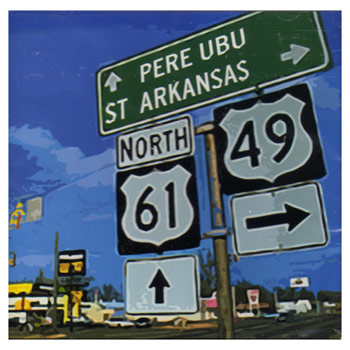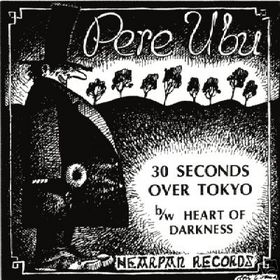FOREWORD: Pere Ubu have been investigating bizarrely conceptualist avant-rock since their humble pre-punk origin in’75. Fronted by skewed art-damaged relic, David Thomas, they’ve released dozens of strangely divergent original albums, EP’s and singles over the years. I was supposed to see Pere Ubu when they played Warsaw in Brooklyn during ’04 (after I conducted this interview), but a foot of snow kept me away. But I heard the half-filled audience nonetheless loved every minute of it. By ’06, unheralded Keith Moline (of Thomas’ concurrent band, the whimsical Two Pale Boys) had replaced long-time guitarist Tom Herman for the R & B-soaked Why I Hate Women. This article originally appeared in Aquarian Weekly.
“Rock is a folk music with a shared language building upon what’s gone before so you recognize it as such and realize it’s to be heard in that context,” claims dignified avant eccentric David Thomas. A fixture in Cleveland’s ‘70s underground scene under the alias Crocus Behemoth, the idiosyncratic, warp-quirked squiggly-voiced Thomas formed Pere Ubu with now-deceased guitarist-critic Peter Laughner from the remnants of bizarre, esoteric icons Rocket From The Tombs.
After the abstruse skull-fuckery of Pere Ubu’s ‘77 5-song single, “Datapanik In the Year Zero,” and the audacious long-play debut, The Modern Dance, ‘78s magnificent Dub Housing countered straightforward fare such as “Ubu Dance Party” and the funhouse chant-along “Caligari’s Mirror” with the obtusely out of tune “Drinking Wine Spodyody.” Synthesizer wizard Allen Ravenstine was given free reign to exploit sonic debris.
Though its ideas weren’t as compressed or compelling, ‘79s static New Picnic Time moved the ever-changing combo so far left that inventive psychedelic dadaist Mayo Thompson of art-damaged bohos Red Crayola came aboard for ‘80s far better The Art of Walking and ‘82s less thrilling Song of the Bailing Man.
Following a tumultuous breakup, Thomas formed the Pedestrians and recorded The Sound of the Sand with Brit-folk legend Richard Thompson and a host of Ubu-related pals. As David Thomas and the Wooden Birds, he unleashed the ecliptic Blame The Messenger with Ravenstine, Ubu mainstay Tony Maimone (bass), Jim Jones (guitar), and Chris Cutler (drums). This lineup became the new Pere Ubu for ‘88s re-energized The Tenement Year.
While ‘89s nearly perfect Cloudland refined their more pop-oriented approach, ‘91s gloomier Worlds In Collision added Captain Beefheart sideman Eric Drew Feldman to the clan. The hardest rocking, most accessible Ubu disc yet, ‘93s Story Of My Life led to ‘95s resilient 61-minute marathon Raygun Suitcase. Former guitarist Tom Herman was welcomed back into the fold for ‘98s obtuse Pennsylvania, securing the lineup (theremin-synthesizer player Robert Wheeler; bassist Michele Temple; and drummer-organist Steve Mehlman) that would make ‘02s fantastic travelogue St Arkansas.
 Using the road as a metaphor, St Arkansas’ skeletal sketches scour scurried scatalogical schisms with stark psychosis. The gloomy visage, “Dark,” where ‘AM radio sets you free’ as the ‘ghost town rises,’ matches the haunting paleness of Ubu’s best material, as does the sinister “Michele.” The fast moving bass chugger “333” and the beat-driven hitchhiking lament “Phone Home Jonah” provide motorific relief.
Using the road as a metaphor, St Arkansas’ skeletal sketches scour scurried scatalogical schisms with stark psychosis. The gloomy visage, “Dark,” where ‘AM radio sets you free’ as the ‘ghost town rises,’ matches the haunting paleness of Ubu’s best material, as does the sinister “Michele.” The fast moving bass chugger “333” and the beat-driven hitchhiking lament “Phone Home Jonah” provide motorific relief.
Just as the meek shall inherit the earth as cockroaches and locusts roam free, Pere Ubu not only set the stage for the independent late-‘70s do-it-yourself punk insurgence, but somehow managed to outlive relegated offshoots new wave, grunge, and alt-rock in the 30-year process. So meet the new boss same as the old boss.
Why was there a 4-year stretch from Pere Ubu’s last studio set, Pennsylvania, and St Arkansas?
DAVID: We’re not a professionally recorded rock and roll band. We do things haphazardly. We’re not a commercially successful band on a treadmill with a record company hoping for our next record. Nobody told us we had to go about our career a certain way. I did a few LP’s with my improvisational group. I did Surf’s Up with Two Pale Boys, and a Mirror Man opera.
Who were your early influences?
DAVE: It’s hard to re-create influences. Even t.v. and what goes on in the world affects music. At the time we were formulating what we were doing, rock was a thin, broad church. In the early ‘70s, a very exciting time when pigeonholing of music didn’t exist, after Hendrix opened for the Monkess – which nobody thought was terribly weird just slightly odd – we never found it difficult marrying art music with pop or simple ideas with difficult riffs. Groups were exploring synthesizers in concrete sound. We were forerunners of that movement. People were working towards that earlier like MC5, Velvet Underground, Terry Riley, and the Silver Apples. Everything from Krautrock to pop was influential at that point. Integrating concrete sound with non-musical analog synth into musical forms in a narrative voice was in its formative stage.
Fans back then paid attention to what was happening in the underground thanks to burgeoning free form FM radio.
DAVE: Cleveland was the nexus for music from all over the world. Record stores competed to have the most complete catalog. At the same time, it didn’t pay to be in a band that wasn’t a copy band. You’d play for yourself. It was an inwardly turning attitude of no one likes you so do what you want. It’s liberating and shaped our attitude since.
Would you consider yourself an avant-surrealist pitted in the historical timeframe between Captain Beefheart and New York’s No Wave movement?
DAVE: Sure. I like being called avant. That and a dollar get you a cup of coffee.
Eric Drew Feldman of Beefheart’s band played on Worlds In Collision and the live Apocalypse Now. Did you ever meet his infamous, now-estranged boss?
DAVE: Years before I met Eric, I interviewed Beefheart for a radio show. I was a journalist for the weekly rag, The Scene, and my connection with the station gave me access. I met him backstage and hung out as long as he permitted it to happen. The station changed formats next week so I don’t know if it was ever broadcast.
 Pere Ubu’s early single, “30 Seconds Over Tokyo / Heart Of Darkness,” profoundly ushered in the age of independent recording.
Pere Ubu’s early single, “30 Seconds Over Tokyo / Heart Of Darkness,” profoundly ushered in the age of independent recording.
DAVE: Television’s “Little Johnny Jewel” came out two months ahead of us. It’s like Pet Sounds coming out after Sgt. Pepper and Pepper gets the credit. No one would release our singles. It was supposed to be the end of Pere Ubu. Leave a record behind for someone to find in a Salvation Army record bin.
Whereas Pennsylvania was artily eccentric with lots of open spaces and not at all mainstream, St Arkansas seems more approachable and semi-thematic.
DAVE: It’s about driving Highway 49 from Conway, Arkansas to Oxford or Tupelo, Mississippi. The motive was to let the road write the songs. I decided to drive cross-country, visit someone in Arkansas, and on the way back to Cleveland, take this road.
Where ‘AM radio sets you free’?
DAVE: I listen to everything on the radio. There’s double meaning to the chorus, which is usually the case with Pere Ubu. It’s a dark, obsessive song.
Each twisted Pere Ubu tune has a stylistically diverse abstract mission unto itself.
DAVE: That’s the way it’s supposed to be. You want to create unique stuff and pump more data down the data stream. The ambition is to cram more into less space and tell a story with fewer words.
What new bands do you appreciate?
DAVE: I like Yo La Tengo. (Band mates) Ira and Georgia saw my opera I was in on the West End. I like Spiritualized, Steve Earle, and Mark Mulcahy, formerly of Miracle Legion. He’s done a series of good solo releases.